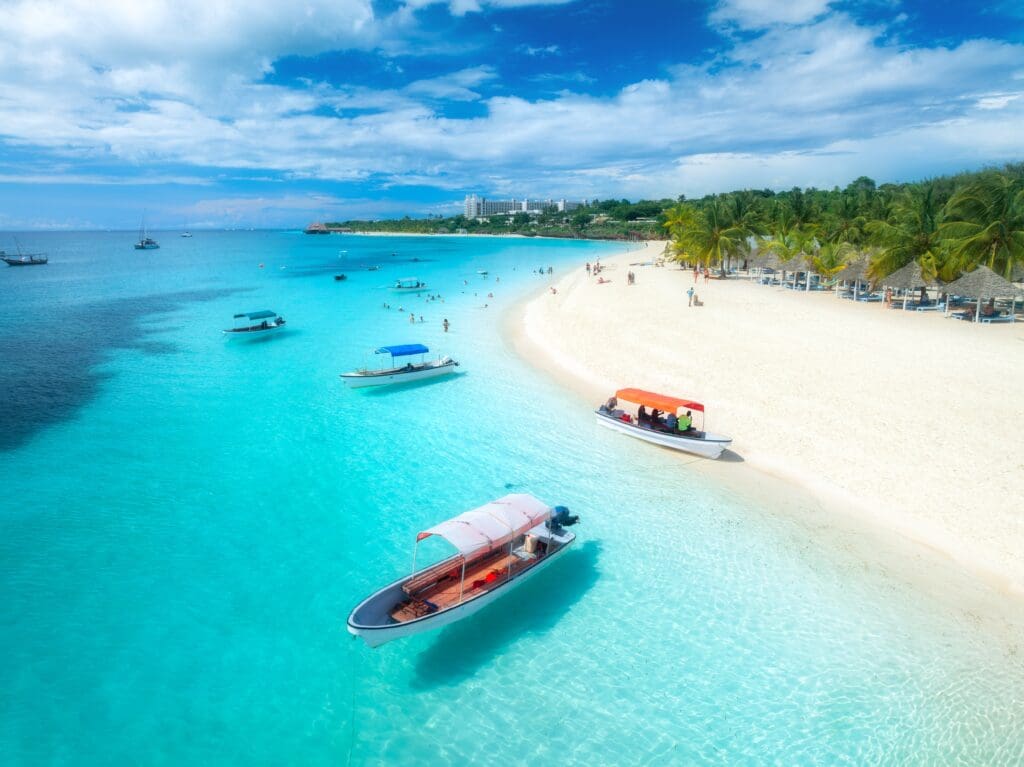Nestled in the azure waters of the Indian Ocean, Zanzibar is a gem that beckons travellers with its white sandy beaches, rich cultural tapestry, and a history that’s as intriguing as it is tumultuous. This semi-autonomous region of Tanzania, also known as Unguja, is more than just a picturesque getaway. It is a vibrant melting pot of African, Arab, European, and Indian influences, each adding a unique flavour to the island’s identity.
A History of Empires and Revolution
Zanzibar’s history is marked by periods of Portuguese, Omani, and British influence before it joined with Tanganyika to form Tanzania in 1964. The Zanzibar Revolution in 1964 was a defining moment, leading to significant social changes and the end of the sultanate.
Why Visit Zanzibar?
The allure of Zanzibar lies in its diversity. From the labyrinthine streets of Stone Town, a UNESCO World Heritage site, to the tranquil villages that dot the coastline, there’s an adventure around every corner. The island’s history is palpable, with tales of sultans, traders, and explorers woven into the very fabric of its cities and swaying palm trees.
What to Do in Zanzibar
 Zanzibar’s activities cater to all tastes. Adventure seekers can explore the Jozani Forest, home to the rare Zanzibar red colobus monkey, or dive into the crystal-clear waters to discover vibrant coral reefs. History enthusiasts will find a wealth of knowledge in Stone Town, with its historic buildings and bustling markets. For those seeking relaxation, the island’s beaches offer a serene escape from the world.
Zanzibar’s activities cater to all tastes. Adventure seekers can explore the Jozani Forest, home to the rare Zanzibar red colobus monkey, or dive into the crystal-clear waters to discover vibrant coral reefs. History enthusiasts will find a wealth of knowledge in Stone Town, with its historic buildings and bustling markets. For those seeking relaxation, the island’s beaches offer a serene escape from the world.
The Spice Island
Once the centre of the spice and slave trades, Zanzibar earned the nickname “Spice Island” for its production of cloves, nutmeg, cinnamon, and black pepper. Today, visitors can embark on spice tours to learn about the cultivation and uses of these aromatic treasures.
Cuisine
The cuisine of Zanzibar is a delightful fusion of flavours influenced by its history as the “Spice Island.” It’s renowned for its use of fresh, aromatic spices like cloves, nutmeg, cinnamon, and black pepper, which are all locally grown. The food is a blend of Swahili, Indian, Arab, and African cooking styles and given its location fresh fish and seafood and octopus.
Cultural Richness
The island’s cultural festivals are a feast for the senses, showcasing traditional music, dance, and cuisine. The Sauti za Busara music festival and the Zanzibar International Film Festival are just two events that highlight the island’s commitment to celebrating its heritage.
Zanzibar is an experience. It’s a place where history is alive, culture is celebrated, and natural beauty is abundant. Whether you’re wandering through the spice-scented streets of Stone Town, lounging on powdery beaches, or sailing on a traditional dhow at sunset, Zanzibar offers a slice of paradise.


